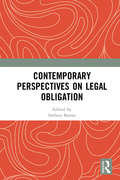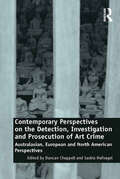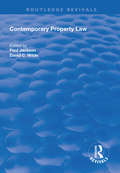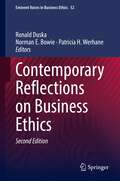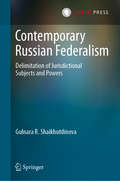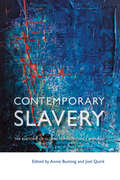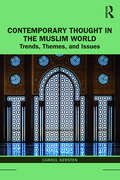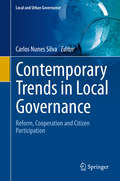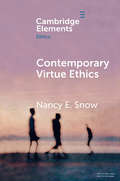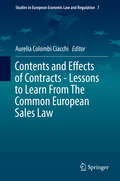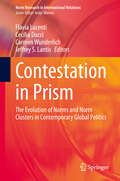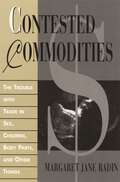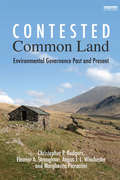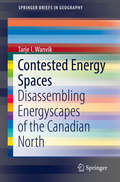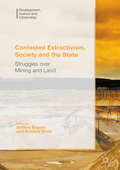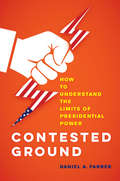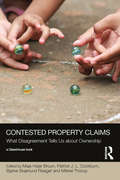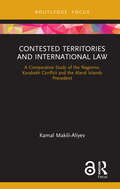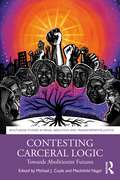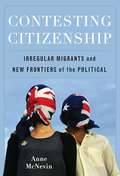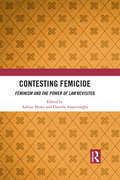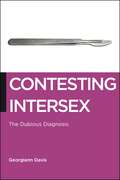- Table View
- List View
Contemporary Perspectives on Legal Obligation
by Stefano BerteaBringing together world-class scholars who have devoted themselves to the study of legal obligation, this book addresses key dimensions of the current debate: providing novel insights and perspectives, as well as critically discussing the leading theories of legal obligation. The notion of legal obligation is widely regarded as fundamental by both legal practitioners and legal theorists. For the language that explicitly refers to obligation is pervasive insofar as paradigmatic legal materials make reference to obligation either directly, by specifying what a subject is obligated to do, or indirectly, by attributing rights, privileges, powers, permissions, and other normative statuses to both single individuals and groups. There is, then, broad agreement that obligation constitutes a central element in legal studies. At the same time, however, there is considerable disagreement among contemporary legal theorists about how legal obligation can or should be elucidated. This book accounts for both the significance of obligation in law and the variety of views of legal obligation championed in legal philosophy today. With contributions from renowned theorists, this book will be invaluable for scholars and students of legal theory, legal philosophy, and jurisprudence.
Contemporary Perspectives on the Detection, Investigation and Prosecution of Art Crime: Australasian, European and North American Perspectives
by Duncan Chappell Saskia HufnagelIn the world of law enforcement art and antiquity crime has in the past usually assumed a place of low interest and priority. That situation has now slowly begun to change on both the local and international level as criminals, encouraged in part by the record sums now being paid for art treasures, are now seeking to exploit the art market more systematically by means of theft, fraud and looting. In this collection academics and practitioners from Australasia, Europe and North America combine to examine the challenges presented to the criminal justice system by these developments. Best practice methods of detecting, investigating, prosecuting and preventing such crimes are explored. This book will be of interest and use to academics and practitioners alike in the areas of law, crime and justice.
Contemporary Property Law (Routledge Revivals)
by Paul Jackson David C. WildeFirst published in 1999, this is the first of two books based on papers given at the conference organised by the Centre for Property Law at Reading in March 1998 under the title ‘Contemporary Issues in Property Law’. Speakers represented jurisdictions from around the world. Their subjects ranged from the theoretical and jurisprudential to the severely practical. No one who attended the conference – or subsequently reads the papers in this and the following book, Property Law: Current Issues and Debates – can believe in the picture of property law as archetypical, dry as dust, black letter, law. Questions of human rights, changes in social structures, technological developments are all shown to have their impact on property law, calling for careful analysis of the present law and practical proposals for reforms to reflect new developments.
Contemporary Reflections on Business Ethics (Issues in Business Ethics #52)
by Ronald DuskaOver 30 years Ronald F. Duska has established himself as one of the leading scholars in business ethics. This book presents Duska’s articles the years on ethics, business ethics, teaching ethics, agency theory, postmodernism, employee rights, and ethics in accounting and the financial services industry. These reflect his underlying philosophical concerns and their application to real-world challenges — a method that might be called an Aristotelian common-sense approach to ethical decision making.
Contemporary Russian Federalism: Delimitation of Jurisdictional Subjects and Powers
by Gulnara R. ShaikhutdinovaThe focus of this book is the legal analysis of the evolution of federal relationships from an asymmetric treaty-constitutional federation to a de facto unitary state. Questioned is whether it is worth returning to the asymmetric federative form, while the aim is to review the origins of federalism in the New Russia, assess the present de jure and de facto situations and analyze whether Russia has a chance of reviving federalism.Steps forward on the way to developed federal relationships in the 1990s have been replaced by steps backwards owing to unitary tendencies in the 2000s and the 2010s. But is this a sustainable state of affairs? The possible ways of framing relations between the center and the constituent units for the next four years and beyond are also discussed.This book is aimed at researchers and students in the field of comparative constitutional law, Russian studies and federal and regional studies.Gulnara R. Shaikhutdinova is Professor and Doctor of International Law in the Faculty of Law of Kazan (Volga Region) Federal University, Republic of Tatarstan, Russian Federation.
Contemporary Slavery: The Rhetoric of Global Human Rights Campaigns
by Joel Quirk Annie BuntingThis volume brings together a cast of leading experts to carefully explore how the history and iconography of slavery has been invoked to support a series of government interventions, activist projects, legal instruments, and rhetorical performances. However well-intentioned these interventions might be, they nonetheless remain subject to a host of limitations and complications. Recent efforts to combat contemporary slavery are too often sensationalist, self-serving, and superficial and, therefore, end up failing the crucial test of speaking truth to power.The widely held notion that antislavery is one of those rare issues that "transcends" politics or ideology is only sustainable because the underlying issues at stake have been constructed and demarcated in a way that minimizes direct challenges to dominant political and economic interests. This must change. By providing an original approach to the underlying issues at stake, Contemporary Slavery will help readers understand the political practices that have been concealed beneath the popular rhetoric and establishes new conversations between scholars of slavery and trafficking and scholars of human rights and social movements.Contributors:Jean Allain, Jonathan Blagbrough, Roy Brooks, Annie Bunting, Austin Choi-Fitzpatrick, Andrew Crane, Rhoda Howard-Hassmann, Fuyuki Kurasawa, Benjamin Lawrance, Joel Quirk, and Darshan Vigneswaran
Contemporary Thought in the Muslim World: Trends, Themes, and Issues (Contemporary Thought in the Islamic World)
by Carool KerstenThis book presents an intellectual history of today’s Muslim world, surveying contemporary Muslim thinking in its various manifestations, addressing a variety of themes that impact on the lives of present-day Muslims. Focusing on the period from roughly the late 1960s to the first decade of the twenty-first century, the book is global in its approach and offers an overview of different strands of thought and trends in the development of new ideas, distinguishing between traditional, reactionary, and progressive approaches. It presents a variety of themes and issues including: The continuing relevance of the legacy of traditional Islamic learning as well as the use of reason; the centrality of the Qur’an; the spiritual concerns of contemporary Muslims; political thought regarding secularity, statehood, and governance; legal and ethical debates; related current issues like human rights, gender equality, and religious plurality; as well as globalization, ecology and the environment, bioethics, and life sciences. An alternative account of Islam and the Muslim world today, counterbalancing narratives that emphasise politics and confrontations with the West, this book is an essential resource for students and scholars of Islam.
Contemporary Trends in Local Governance: Reform, Cooperation and Citizen Participation (Local and Urban Governance)
by Carlos Nunes SilvaThis book addresses and explores recent trends in the field of local and urban governance. It focuses on three domains: institutional reforms in local government; inter-municipal cooperation; and citizen participation in local governance. In the last decades, in different regions of the world, there is ample evidence that sub-national government, in particular the field of local governance, is in a permanent state of change and reflux, although with differences that reflect national particularities. Since these institutional changes have an impact in the local policy process, in the delivery of public services, in the local democracy, and in the quality of life, it is mandatory to monitor these continued institutional changes, to learn and develop with these changes, if possible before these experiences are transferred and replicated in other countries. The editor and contributors address issues of interest for a wide audience, comprising of students and researchers in various disciplines, and policy makers at both national and sub-national tiers of government.
Contemporary Virtue Ethics (Elements in Ethics)
by Nancy E. SnowThis Element provides an overview of the central components of recent work in virtue ethics. The first section explores central themes in neo-Aristotelian virtue ethics, while the second turns the discussion to major alternative theoretical perspectives. The third section focuses on two challenges to virtue ethics. The first challenge is the self-centeredness or egoism objection, which is the notion that certain kinds of virtue ethics are inadequate because they advocate a focus on the person's own virtue and flourishing at the expense of, or at least without due regard for, the concerns of others. The second is situationist challenges to the ideas that there are indeed virtues and that personality is integrated enough to support virtues.
Contemporary and Classic Arguments: A Portable Anthology
by Sylvan Barnet Hugo BedauModelling an extensive range of argumentative writing at half the price, the concise Contemporary & Classic Arguments helps you engage with some of today's most pressing topics through a collection of classic essays that provide time-tested models of effective argument.
Contents and Effects of Contracts-Lessons to Learn From The Common European Sales Law (Studies in European Economic Law and Regulation #7)
by Aurelia Colombi CiacchiThis book presents a critical analysis of the rules on the contents and effects of contracts included in the proposal for a Common European Sales Law (CESL). The European Commission published this proposal in October 2011 and then withdrew it in December 2014, notwithstanding the support the proposal had received from the European Parliament in February 2014. On 6 May 2015, in its Communication 'A Digital Single Market Strategy for Europe', the Commission expressed its intention to "make an amended legislative proposal (. . . ) further harmonising the main rights and obligations of the parties to a sales contract". The critical comments and suggestions contained in this book, to be understood as lessons to learn from the CESL, intend to help not only the Commission but also other national and supranational actors, both public and private (including courts, lawyers, stakeholders, contract parties, academics and students) in dealing with present and future European and national instruments in the field of contract law. The book is structured into two parts. The first part contains five essays exploring the origin, the ambitions and the possible future role of the CESL and its rules on the contents and effects of contracts. The second part contains specific comments to each of the model rules on the contents and effects of contracts laid down in Chapter 7 CESL (Art. 66-78). Together, the essays and comments in this volume contribute to answering the question of whether and to what extent rules such as those laid down in Art. 66-78 CESL could improve or worsen the position of consumers and businesses in comparison to the correspondent provisions of national contract law. The volume adopts a comparative perspective focusing mainly, but not exclusively, on German and Dutch law.
Contestation in Prism: The Evolution of Norms and Norm Clusters in Contemporary Global Politics (Norm Research in International Relations)
by Jeffrey S. Lantis Carmen Wunderlich Flavia Lucenti Cecilia DucciThis book analyses the complex dynamics of international norm contestation and explores how norms adapt and withstand challenges in different settings. Examining the interplay between various types of contestation, norm robustness, and the resilience of norm clusters, it sheds light on what the authors define as ‘contestation in prism’. The book thus presents norm contestation as a multifaceted process with far-reaching implications. In this context, it further discusses different conceptions of contestation, ranging from reactive vs. proactive contestation and applicatory vs. validity contestation, to inadvertent, i.e. interpretive vs. deliberate contestation. It then develops a theoretical model that links contestation ‘in prism’ with studies of norm clusters, or norms that are embedded in broader normative structures and interwoven with other normative meanings. Based on a strong theoretical framing, the book presents in-depth analyses of norm contestation in areas such as regional organizations, nuclear non-proliferation, norms relating to atrocities, and international criminal law. Offering multifaceted perspectives on norm evolutions and their implications, this contribution will appeal to students, scholars, and researchers of international relations and related disciplines, as well as policy-makers interested in a better understanding of contestation and norm cluster resiliency.
Contested Commodities
by Margaret Jane RadinNot only are there willing buyers for body parts or babies, Radin observes, but some desperately poor people would be willing sellers, while better-off people find such trades abhorrent. Radin observes that many such areas of contested commodification reflect a persistent dilemma in liberal society: we value freedom of choice and simultaneously believe that choices ought to be restricted to protect the integrity of what it means to be a person. She views this tension as primarily the result of underlying social and economic inequality, which need not reflect an irreconcilable conflict in the premises of liberal democracy.As a philosophical pragmatist, the author therefore argues for a conception of incomplete commodification, in which some contested things can be bought and sold, but only under carefully regulated circumstances. Such a regulatory regime both symbolizes the importance of nonmarket value to personhood and aspires to ameliorate the underlying conditions of inequality.
Contested Common Land: Environmental Governance Past and Present
by Christopher P. Rodgers Eleanor Straughton Angus J.L. Winchester Margherita PieracciniThis innovative and interdisciplinary book makes a major contribution to common pool resource studies. It offers a new perspective on the sustainable governance of common resources, grounded in contemporary and archival research on the common lands of England and Wales - an important common resource with multiple, and often conflicting, uses. It encompasses ecologically sensitive environments and landscapes, is an important agricultural resource and provides public access to the countryside for recreation. Contested Common Land brings together historical and contemporary legal scholarship to examine the environmental governance of common land from c.1600 to the present day. It uses four case studies to illustrate the challenges presented by the sustainable management of common property from an interdisciplinary perspective - from the Lake District, Yorkshire Dales, North Norfolk coast and the Cambrian Mountains. These demonstrate that cultural assumptions concerning the value of common land have changed across the centuries, with profound consequences for the law, land management, the legal expression of concepts of common 'property' rights and their exercise. The 'stakeholders' of today are the inheritors of this complex cultural legacy, and must negotiate diverse and sometimes conflicting objectives in their pursuit of a potentially unifying goal: a secure and sustainable future for the commons. The book also has considerable contemporary relevance, providing a timely contribution to discussion of strategies for the implementation of the Commons Act of 2006. The case studies position the new legislation in England and Wales within the wider context of institutional scholarship on the governance principles for successful common pool resource management, and the rejection of the 'tragedy of the commons'.
Contested Energy Spaces: Disassembling Energyscapes of the Canadian North (SpringerBriefs in Geography)
by Tarje I. WanvikThis authored brief discusses how to conceptualize the socio-material complexity of contested energy spaces in the Canadian North, specifically in the context of indigenous communities that have allowed industrial developments to occur on their lands despite the environmental and lifestyle consequences. By applying assemblage theory, the author identifies contested energy spaces as complex places or situations that need to be understood through geographical concepts of place, scale, and power. In 6 chapters, the book challenges preconceptions of indigenous peoples as victims by examining communities that favor industrial developments, and identifies instabilities in the Canadian North to analyze the power relations between industry, state and indigenous communities. The book will be of interest to undergraduate and graduate students, teachers and lecturers, and geography scholars.Chapter 1 introduces the concept of energy spaces, and addresses the main research question posed in the text; why do some indigenous communities support extractive industry developments on their traditional territories, despite substantial destruction of the local environment and traditional indigenous land use practices? Chapter 2 further elaborates on the conceptualization of contested energy spaces, and chapter 3 applies this to the study area in Alberta, Canada. Chapter 4 discusses the methodology of the research process, and chapter 5 presents empirical cases in Alberta, from the changing governance structures of energy spaces to the networking of local indigenous communities. Chapter 6 concludes the brief by summarizing he findings, and by offering advice to all stakeholders regarding the dangers of leaving government processes to market forces alone.
Contested Extractivism, Society and the State: Struggles over Mining and Land (Development, Justice and Citizenship)
by Bettina Engels Kristina DietzThis book empirically discusses recent struggles over land and mining, exploring state-society relations conflicts on various scales. In contrast with the existing literature, analyses in this volume deliberately focus on large-scale land use changes both in relation to the expansion of industrial mining and to agro-industry. The authors contend that there are significant parallels between contestations over different variants of resource extractivism, as they reflect the same global trends and processes. Chapters draw on critical theoretical approaches from political ecology, political economy, spatial theory, contentious politics, and the study of democracy. The authors not only provide empirical insights on actual resource struggles from different world regions based on in-depth field research, but also contribute to theory-building by linking concepts from various critical approaches to one another, developing a perspective for analysing struggles over resources related to current global crisis phenomena.
Contested Ground: How to Understand the Limits of Presidential Power
by Dan A. FarberThe Trump presidency was not the first to spark contentious debates about presidential power, but its impact on these debates will reverberate far beyond his term. The same rules must apply to all presidents: those whose abuses of power we fear, as well as those whose exercises of power we applaud. In this brief but wide-ranging guide to the presidency, constitutional law expert Daniel Farber charts the limits of presidential power, from the fierce arguments among the Framers to those raging today. Synthesizing history, politics, and settled law, Contested Ground also helps readers make sense of the gaps and gray areas that fuel such heated disputes about the limits of and checks on presidential authority. From appointments and removals to wars and emergencies, Contested Ground investigates the clashes between branches of government as well as between presidential power and individual freedom. Importantly, Farber lays out the substance of constitutional law and the way it is entwined with constitutional politics, a relationship that ensures an evolving institution, heavily shaped by the course of history. The nature of the position makes it difficult to strike the right balance between limiting abuse of power and authorizing its exercise as needed. As we reflect on the long-tailed implications of a presidency that tested these limits of power at every turn, Contested Ground will be essential reading well after today’s political climate stabilizes (or doesn’t).
Contested Justice
by Carsten Stahn De Vos, Christian and Kendall, Sara and Stahn, Carsten Christian De Vos Sara KendallThe International Criminal Court emerged in the early twenty-first century as an ambitious and permanent institution with a mandate to address mass atrocity crimes such as genocide and crimes against humanity. Although designed to exercise jurisdiction only in instances where states do not pursue these crimes themselves (and are unwilling or unable to do so), the Court's interventions, particularly in African states, have raised questions about the social value of its work and its political dimensions and effects. Bringing together scholars and practitioners who specialise on the ICC, this collection offers a diverse account of its interventions: from investigations to trials and from the Court's Hague-based centre to the networks of actors who sustain its activities. Exploring connections with transitional justice and international relations, and drawing upon critical insights from the interpretive social sciences, it offers a novel perspective on the ICC's work. This title is also available as Open Access.
Contested Property Claims: What Disagreement Tells Us About Ownership (Social Justice)
by Mikkel Thorup Maja Hojer Bruun Patrick Joseph Cockburn Bjarke Skærlund RisagerProperty relations are such a common feature of social life that the complexity of the web of laws, practices, and ideas that allow a property regime to function smoothly are often forgotten. But we are quickly reminded of this complexity when conflict over property erupts. When social actors confront a property regime – for example by squatting – they enact what can be called ‘contested property claims’. As this book demonstrates, these confrontations raise crucial issues of social justice and show the ways in which property conflicts often reflect wider social conflicts. Through a series of case studies from across the globe, this multidisciplinary anthology brings together works from anthropologists, legal scholars, and geographers, who show how exploring contested property claims offers a privileged window onto how property regimes function, as well as an illustration of the many ways that the institution of property shapes power relationships today.
Contested Regime Collisions
by Blome, Kerstin and Fischer-Lescano, Andreas and Franzki, Hannah and Markard, Nora and Oeter, Stefan Kerstin Blome Andreas Fischer-Lescano Hannah Franzki Nora Markard Stefan OeterThis collection of innovative contributions to the study of legal pluralism in international and transnational law focuses on collisions and conflicts between an increasing number of institutional and legal orders, which can manifest themselves in contradictory decisions or mutual obstruction. It combines theoretical approaches from a variety of disciplines with theoretically informed case studies in order to further understanding of the phenomenon of regime collisions. By bringing together scholars of international law, legal philosophy, the social sciences and postcolonial studies from Latin America, the United States and Europe, the volume demonstrates that collisions between various institutional and legal orders affect different regions in different ways, and highlights some of their problematic consequences and identifies methods of addressing such collisions in a more productive manner.
Contested Territories and International Law: A Comparative Study of the Nagorno-Karabakh Conflict and the Aland Islands Precedent
by Kamal Makili-AliyevThis book considers the possibilities for resolution of the Nagorno-Karabakh Conflict in the context of comparative international law. The armed conflict between Armenia and Azerbaijan over the territory of the Nagorno-Karabakh has been on the peace and security agenda since the dissolution of the Soviet Union. This volume draws parallels with a similar situation between Sweden and Finland over sovereignty of the Aland Islands in the early 20th century. Resolved in 1921, it is argued that this represents a model autonomy solution for territorial conflicts that include questions of territorial integrity, self-determination and minority rights. The book compares both conflict situations from the international law perspective, finding both commonalities and dissimilarities. It advances the application of the solution found in the Aland Islands precedent as a model for the resolution of the Nagorno-Karabakh Conflict, and provides appropriate recommendations for its implementation. The book will be of interest to academics, researchers and policymakers in the areas of international law and security, conflict resolution and international relations.
Contesting Carceral Logic: Towards Abolitionist Futures (Routledge Studies in Penal Abolition and Transformative Justice)
by Michael J. Coyle Mechthild NagelContesting Carceral Logic provides an innovative and cutting-edge analysis of how carceral logic is embedded within contemporary society, emphasizing international perspectives, the harms and critiques of using carceral logic to respond to human wrongdoing, and exploring penal abolition thought. With chapters from scholars across many disciplines, people in prison, as well as penal abolition activists, the book explores what a future without carceral logic would look like, as well as how such a future is to be developed. The book is also an exploration of penal abolition thought as it is developing in the twenty-first century. Diverse geographical, cultural, identity and experiential frames inform the book’s themes of analysing carceral logic as it harms disparate people in disparate places, creating anti-carceral knowledge, exploring case studies pointing to radical alternatives, and to contesting carceral logic from below. Ultimately, Contesting Carceral Logic provides the reader with an alternative and critical perspective from which to reflect on carceral logic, the punitive state and the criminalizing systems that almost exclusively dominate across the world. Finally, it raises the questions of how we are to build communities as well as transform our response to human wrongdoing in ways that are not defined by racism/ethnocentrism, class war and heteropatriarchy. Contesting Carceral Logic will be of great interest to not only scholars and activists, but also provides an introduction to key carceral issues and debates for students of penology, criminology, social policy, geography, politics, philosophy, social work and social history programmes in countries all around the world.
Contesting Citizenship: Irregular Migrants and New Frontiers of the Political
by Anne McNevinIrregular migrants complicate the boundaries of citizenship and stretch the parameters of political belonging. Comprised of refugees, asylum seekers, "illegal" labor migrants, and stateless persons, this group of migrants occupies new sovereign spaces that generate new subjectivities. Investigating the role of irregular migrants in the transformation of citizenship, Anne McNevin argues that irregular status is an immanent (rather than aberrant) condition of global capitalism, formed by the fast-tracked processes of globalization.McNevin casts irregular migrants as more than mere victims of sovereign power, shuttled from one location to the next. Incorporating examples from the United States, Australia, and France, she shows how migrants reject their position as "illegal" outsiders and make claims on the communities in which they live and work. For these migrants, outsider status operates as both a mode of subjectification and as a site of active resistance, forcing observers to rethink the enactment of citizenship. McNevin connects irregular migrant activism to the complex rescaling of the neoliberal state. States increasingly prioritize transnational market relations that disrupt the spatial context for citizenship. At the same time, states police their borders in ways that reinvigorate territorial identities. Mapping the broad dynamics of political belonging in a neoliberal era, McNevin provides invaluable insight into the social and spatial transformation of citizenship, sovereignty, and power.
Contesting Femicide: Feminism and the Power of Law Revisited
by Adrian Howe Daniela AlaattinoğluFocusing on femicide, this book provides a contemporary re-evaluation of Carol Smart’s innovative approach to the law question as first outlined in her ground-breaking book, Feminism and the Power of Law (Routledge 1989). Smart advocated turning to the legal domain not so much for demanding law reforms as construing it as a site on which to contest gender and more particularly, gendered constructions of women’s experiences. Over the last 30 to 40 years, feminist law scholars and activists have launched scathing trans-jurisdictional critiques of the operation of provocation defences in hundreds of femicide cases. The evidence unearthed by feminist scholars that these defences operate in profoundly sexed ways is unequivocal. Accordingly, femicide cases have become critically important sites for feminist engagement and intervention across numerous jurisdictions. Exploring an area of criminal law that was not one of Smart’s own focal concerns, this book both honours and extends Smart’s work by approaching femicide as a site of engagement and counter-discourse that calls into question hegemonic representations of gendered relationships. Femicide cases thus provide a way to continue the endlessly valuable discursive work Smart advocated and practised in other fields of law: both in articulating alternative accounts of gendered relationships and in challenging law’s power to disqualify women’s experiences of violence while privileging men’s feelings and rights.
Contesting Intersex: The Dubious Diagnosis (Alternative Criminology #10)
by Georgiann DavisAn elucidating study of the medical management of intersex diagnoses and the political engagement of intersex activists. When sociologist Georgiann Davis was a teenager, her doctors discovered that she possessed XY chromosomes, marking her as intersex. Rather than share this information with her, they withheld the diagnosis to &“protect&” her gender identity; it was years before Davis would see her own medical records as an adult and learn the truth. Davis&’s experience is not unusual. Historically, medical practices that uphold conventional notions of the male/female sex binary have led to secrecy about being intersex. Yet, the rise of intersex activism and visibility in the U.S. has caused a major shift in thinking, calling into question the practice of classifying intersex as an abnormality, rather than a mere biological variation. In this book, Davis draws on interviews with intersex people, their parents, and medical experts to explore the evolution of thought in regard to intersex visibility and transparency in medical and activist communities. A personal and scholarly journey into medical and social activism, Contesting Intersex presents a unique perspective on how medical diagnoses can affect lives profoundly. Winner, 2017 Sex and Gender Distinguished Book Award, presented by the American Sociological Association Winner, 2016 Donald Light Award for the Applied or Public Practice of Medical Sociology, presented by the American Sociological Association
